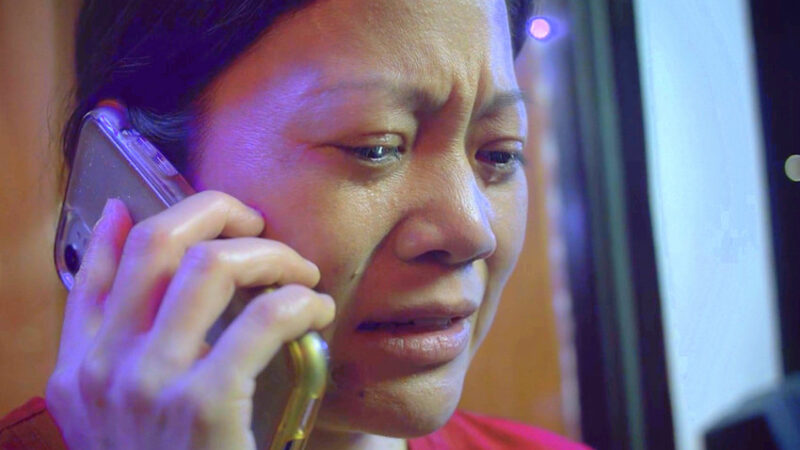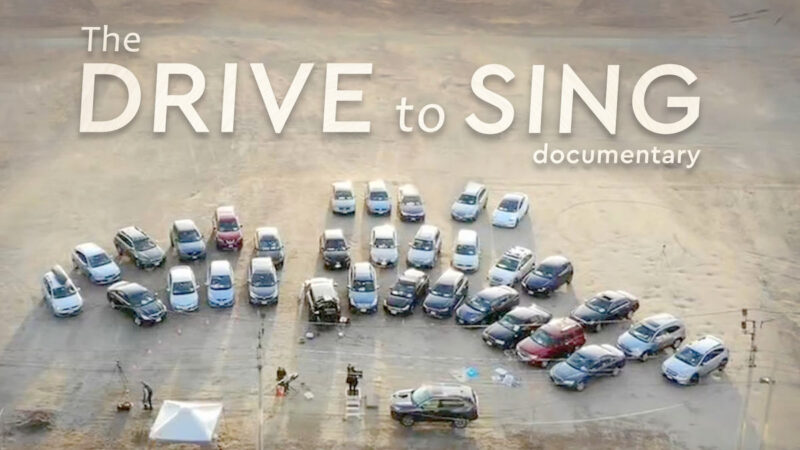
An Industry Case Study
Narrative | Dramatic Features
Film Name: Street Reporter
Genre: Documentary
Length of film: 27 minutes
Date: July 2021
Director: Laura Waters Hinson
Producer: Laura Waters Hinson and Bryan Bello
Executive Producer: John and Ed Priddy, Nancy Schafer, Hilla Medalia
Writer: Laura Waters Hinson
Cinematographer: Kasey Kirby, Richard Yeagley
Editor: Dan Sadowsky and Richard Yeagley
Composer: Chanda Dancy
Production Company: Image Bearer Pictures, LLC
Budget: $75000
Financing: Grants
Shooting Format: Digital video
Screening Format: DCP
World Premiere: Indy Shorts Film Festival 2021
Awards:
– Winner Best Short Documentary Annapolis Film Festival, April 2022
– Finalist Best Short Doc Palm Springs International ShortFest, June 2022
– Official Selection Big Sky Documentary Film Fest – US Northwest Premiere in Feb 2022
– Finalist Best Short Doc, Pan African Film Festival – West Coast premiere, April 2022
– The Winner Social Impact Media Award for Creative Activism, 2022
– A Winner Audience Choice Award – Austin Film Festival 2021
– Winner Audience Choice Award – IndyShorts Film Festival 2021
– Winner Audience Choice Award DC Shorts Film Festival, 2022
– The Official Selection United Nations Association Film Festival, Oct 2022
– A Official Selection Washington West Film Festival, Oct 2022
– Official Selection Original Thinkers Festival, October 2022
– The Official Selection St Louis International Film Festival 2021
– Official Selection Rocky Mountain Women’s Film Festival 2021
– Official Selection Heartland Film Fest 2021
Website: streetreporterfilm
The Official Trailer for Street Reporter
Watch The Trailer for Street Reporter directed by Laura Waters Hinson
A Short Biography of Laura Waters Hinson
Laura Waters Hinson is an award-winning filmmaker whose work elevates the themes of empathy, resilience, and reconciliation. She is committed to collaboration and trust-building. She partners with her subjects to tell stories tinged with vulnerability and hope that transcend borders, creeds and stereotypes. Laura works to produce films that are both entertaining and socially significant. This brings viewers together to find common ground in a diverse world.
The Laura Waters Hinson Interview
indieactivity: What is your film about?
Laura Waters Hinson (LWH): Street Reporter tells the journey of Sheila White. Sheila dreams of becoming a photojournalist despite living in a women’s homeless shelter. At age 59, she decides to go to college while serving as a reporter for the local street newspaper. There she joins other journalists writing about their experience of homelessness. Street Reporter follows Sheila as she discovers the power of her own voice. And the re-humanizing effects of life’s most basic need: a place to call home.
The film came about as a result of my work at American University, where I teach film and direct the Community Voice Lab, which produces documentary films that capture the voices of community storytellers too often unseen and unheard. I have also been a resident of the District of Columbia for nearly two decades and witnessed the homelessness crisis expand around me as the city experienced unprecedented levels of development in a very short period. The pandemic only exacerbated these issues.
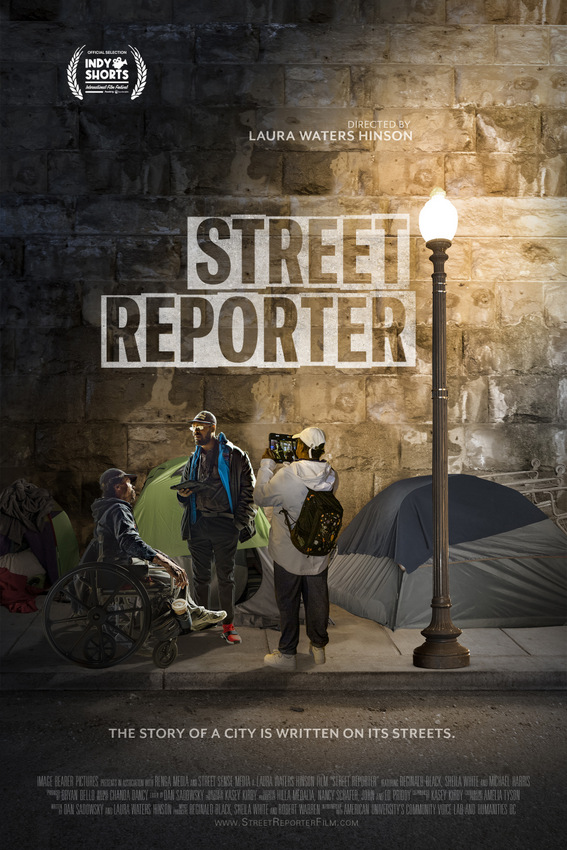
Through the Community Voice Lab, I partnered with Producer Bryan Bello, a PhD candidate in the School of Communication at American University with a passion for citizen journalism. Bryan co-founded the nation’s first homeless filmmaking cooperative at Street Sense Media, of which Sheila White was a member. Street Reporter began as a “meta” story: our production team followed a group of journalist-filmmakers reporting on the story of “tent city” for the local street newspaper.
After months of filming with the reporting team, I realized that Sheila’s story was the one I needed to tell. Sheila was on a clear journey to overcome the obstacles in her life and to achieve her dream of becoming a photojournalist by going back to school at the age of 59. I felt that her story could bring hope to people facing similar challenges, while also breaking down the tired stereotypes many people have about those experiencing homelessness.
Tell us about the festival run, marketing and sales?
Laura Waters Hinson (LWH): Street Reporter had its world premiere at the Oscar-qualifying Indy Shorts Film Festival in Indianapolis, which is an extension of the Heartland Film Festival. We were thrilled when the film won the Overall Audience Choice Award at Indy Shorts, which helped create energy for the film’s release. Since then, Street Reporter has won Best Short Documentary at the Annapolis Film Festival and was a finalist for Best Short Doc at the Palm Springs International ShortFest and the Austin Film Festival. It also won a Social Impact Media Award (SIMA) for Creative Activism.
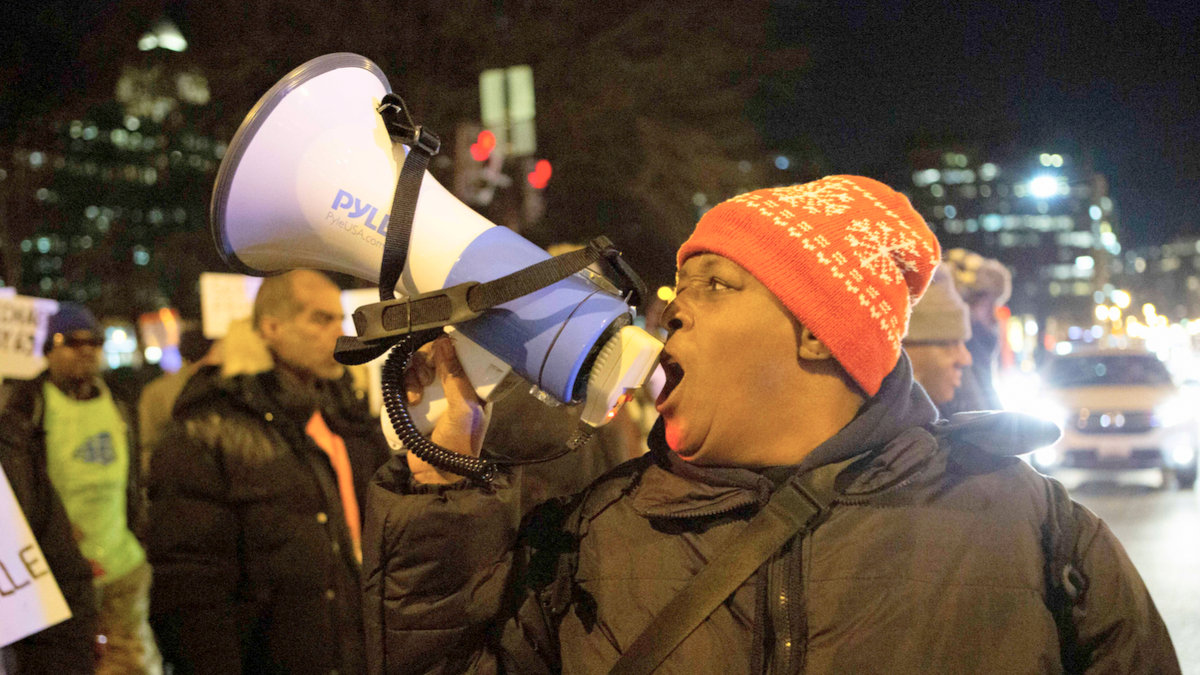
The film won additional audience awards at the Austin Film Festival and the DC Shorts Film Festival and we’ve been honored to screen at numerous other festivals over the past year, including Big Sky Documentary Film Festival, Pan African Film Festival, Rocky Mountain Women’s Film Festival, Original Thinkers Festival, St. Louis International Film Festival, United Nations Association Film Festival and the Washington West Film Festival.
Give the full Official Synopsis for your film?
Laura Waters Hinson (LWH): Sheila White, 59, dreams of becoming a photojournalist and overcoming her experience of homelessness. Yearning to make this change, she studies at a local university while completing homework late into the night at the women’s shelter. As a reporter at Street Sense newspaper, Sheila and her team decide to cover the story of DC’s “Tent City.” Along the way, they meet a charismatic tent resident named Mike who, much like Sheila, longs for life outside the underpass.
As the city moves to shut down the encampment, our subjects’ journeys are threatened by the COVID-19 pandemic, with unexpected results. Street Reporter is a deeply intimate, character-based film produced with community collaborators that provides a window into the power of community journalism in one woman’s life, casting a vision of the re-humanizing effects of life’s most basic need: a place to call home.

Development & Financing?
Laura Waters Hinson (LWH): The film was funded by a grant from HumanitiesDC, a local affiliate of the National Endowment of the Arts, as well as by various grants from American University and the Humanities Truck. I wrote a lot of grants!
Production?
Laura Waters Hinson (LWH): Production began in Fall of 2019 in Washington, DC, and concluded in June of 2021. The pandemic definitely slowed down our process, and yet, in the end, it was a blessing as the story unfolded in unexpected ways that produced a more universal and emotionally resonant ending. The editing process was challenging, as there were so many powerful stories that we couldn’t include in the short film format. We spent months editing one version of the film that featured three, co-equal protagonists.
After receiving some tough feedback on that version, I realized that viewers were struggling to connect with so many characters. So, I followed up with Sheila to see how she was doing and discovered that she had made some transformational life changes. I decided to keep filming Sheila and then I re-cut the film entirely to shape it around the narrative of her life. I didn’t eliminate the other two participants, but they became “supporting” characters to Sheila’s story.
At the time, it was extremely painful to see so much of the film end up on the “cutting room floor” but, instantly, viewers started connecting in a more immediate way to the story and festivals began responding with acceptances rather than the dreaded impersonal rejection letter.
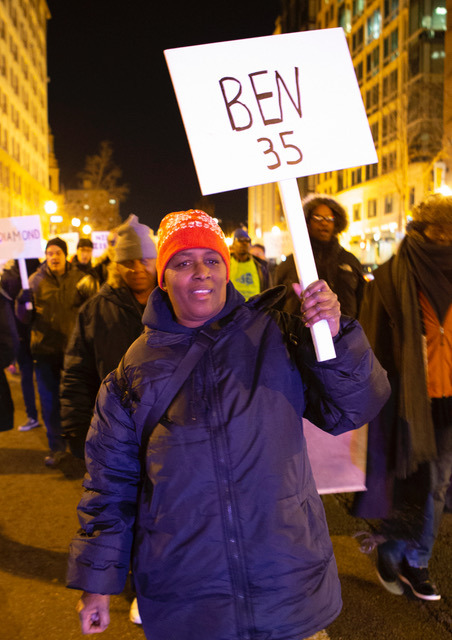
Festival Preparation & Strategy?
Laura Waters Hinson (LWH): This is the seventh independent film I’ve directed, so, thankfully, I have a track record with a few festivals that often program films made by alums. I also targeted festivals that have a strong social impact theme and motivate audiences. At nearly 27 minutes long, I knew the length of the film would make it hard to program at some festivals since that’s a lot of real estates to use up within a 90-minute short program. I’ve been surprised by the number of festivals we’ve gotten into given the length.
Thankfully, once a film plays in several festivals, you often will get interested from programmers at other festivals inviting you to apply, which is encouraging. Now that the film is eligible to compete at the Oscars, I’ve been thrilled to work with Catherine Lyn Scott and her team at London Flair PR as they endeavor to help me to reach a broader audience.
The Release?
LWH: The film is still on the festival circuit, and we are actively seeking distribution now.
Advice from the Filmmaker?
LWH: The main thing I’ve learned from making this film is to trust your instincts as a storyteller, regardless of the consequences. My experience of dismantling “Version 1” of the film (which was complete with color correction and sound design), was agonizing but necessary. As hard as it was for our team to re-open the edit and eliminate some of our favorite scenes, I was certain that reshaping the narrative would ultimately connect with audiences in a more direct way, (and I was right!).
To that end, my advice is to trust your gut and make hard decisions if they’re in service to the overall vision of your film. My other piece of advice for documentary filmmakers is to study the basics of narrative structure. Whenever you’re stuck in an edit, it is critical to reflect on how your film is working on a structural level and whether the goals of your protagonist are clear, and the stakes are evident. That will keep your audience engaged from start to finish.
Tell us what you think of the Case Study for Street Reporter. What do you think of it? Let’s have your comments below and/or on Facebook. Or join me on Twitter.
Follow Laura Waters Hinson on Social Media
Website
IMDb
LinkedIn
Twitter
Instagram
Vimeo
MORE STORIES FOR YOU

